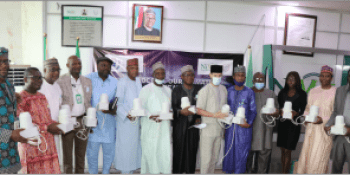To what extent are farmers willing to pay for climate information in Burkina Faso?

A new study assesses farmers' willingness to pay for climate information services in Burkina Faso.
A study entitled "Farmers’ Willingness to Pay for Climate Information Services: Evidence from Cowpea and Sesame Producers in Northern Burkina Faso" has been published in the journal Sustainability.

The study was based on the premise that the use of climate information services (CIS) has the potential to improve the resilience of agriculture to climate shocks in Burkina Faso, where agriculture is mainly rainfed. It builds on an earlier pilot project (CIS in West Africa) that demonstrated how access to and use of CIS was an important tool for reducing the effects of climate variability and change on crop production and increasing the resilience and adaptive capacity of producers. The work is an entry point for bringing CIS to scale and sustaining their use by cowpea and sesame growers in the Yatenga province of Burkina Faso where CCAFS is implementing one of its Climate-Smart Villages. It was conducted by researchers from CCAFS West Africa and the National Institute for Environmental and Agricultural Research of Burkina Faso (INERA).
Study methodology
Data was collected using a structured questionnaire. One hundred seventy farmers were randomly selected from 17 villages in the Yatenga province in Northern Burkina Faso. Information on various household and farm characteristics and farmers’ willingness to pay for CIS were collected. The following independent variables were considered: gender, education, age, household size, farm size, use of indigenous forecast, exposure to climate information, use of stone line, use of organic manure, secondary activities, and production orientation.
Key findings
- Overall, 63% of farmers were ready to pay for at least one type of CIS (i.e. seasonal climate forecast, decadal climate information, daily climate information and agro-advisories).
- Specifically, 53% of farmers were willing to pay for the seasonal forecast, 33% for decadal and 39% for agro-advisories (Table 1).
- Producers of cowpea and sesame were willing to pay 3706 FCFA (about $7) for seasonal forecast, 1113 FCFA (about $2) for decadal climate information, 1923 FCFA (about $3.5) for daily climate information and 1674 FCFA ($3) for agro-advisories.

Table 1. Descriptive statistics on the willingness of farmers to accept and pay for climate information in Yatenga, Burkina Faso
The study also showed that several socioeconomic and motivation factors such as the gender, age, education of the farm head and awareness of farm head of climate information, influence on farmers’ willingness to pay for CIS.
Conclusion and lessons
There’s a potential market for CIS in the study area if the number of people willing to pay increases by at least 5%. To achieve this, 11% of farmers still need to be convinced by the efficiency and usefulness of the service. Those who can’t afford the service may be financially supported. For businesses, the way forward would be to conduct a holistic economic assessment to determine the potential for the development of a viable business model on climate information services in the Yatenga province.
Read more:
- Journal Article: Farmers’ Willingness to Pay for Climate Information Services: Evidence from Cowpea and Sesame Producers in Northern Burkina Faso
- Project description: Climate InformText goes hereation Services in West Africa
- Brochure: West Africa Climate-Smart Villages Inventory
Dansira Dembélé is the Communications Officer for CCAFS West Africa, based at ICRISAT West and Central Africa.



